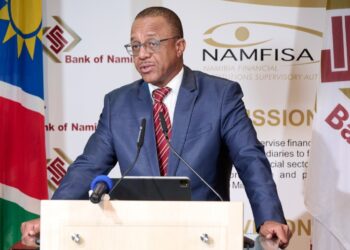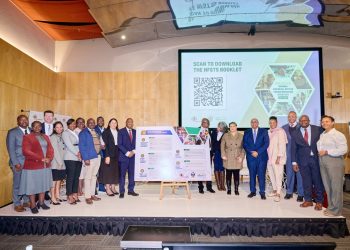
The Bank of Namibia (BoN) says over N$280 million has been paid to small-to-medium enterprises (SMEs) through its SME Economic Recovery Loan Scheme.
The scheme, which was reinstated in February this year, aims to assist distressed SMEs. It provides funds through participating commercial banks, to eligible small businesses to assist in paying for operational expenses such as salaries, rent and lease agreements and contracts with suppliers.Â
“N$280 million has been disbursed to 267 businesses operating in the construction, retail, manufacturing, and oil and gas industries,†the Deputy Governors of BoN, Ebson Uanguta and Leonie Dunn said.Â
The Deputy Governors further highlighted that the domestic growth has slowed to 3.7% during the second quarter of 2023 compared to 8.5% recorded in the prior year’s comparable quarter.Â
“Headline inflation rose to an average of 6.0% during the first eight months of 2023, compared to the average of 5.6% during the corresponding period of 2022. This was mainly on account of increased inflation for food and non-alcoholic beverages, housing, alcohol beverages, and tobacco,†they said.Â
Owing to inflation, the Governors reiterated that the Namibia Dollar peg to the South African Rand is still beneficial to the country and thus will remain in effect.Â
According to the Deputy Governors, the global tightening of monetary policy, coupled with geopolitical tensions creates economic uncertainty, therefore domestic, global, and regional economic developments as well as the peg arrangement and its implications are important to consider when making monetary policy that will benefit Namibia.Â
“The Bank continues to assess the arrangement and has found that it continues to serve Namibia well from a price stability perspective while reducing transactional costs which ultimately benefit the economy,†the Governors said.Â
Probed about the increasing number of household repossessions post Covid-19, the Governors highlighted that interventions such as the determination of policy changes have been instated as a response to economic and financial stability challenges in order to soften the blow for affected households and businesses.Â
They also commended the Ministry of Justice for the steps it has taken to reform the legal process in order to protect the interests of homeowners and lenders.Â
They further said “the Bank expresses its commitment to working with stakeholders to find viable solutions to address these pressing challenges while maintaining financial stabilityâ€.Â
Furthermore, the Governors mentioned that the central Bank’s 2022-2024 strategy employed initiatives that will enhance financial inclusion while at the same time modernising the financial system.
The initiatives mainly include the administration of new and revised laws such as the Payment System Management Act, Act 14 of 2023, the Banking Institutions Act No. 13 of 2023, and the Virtual Assets Act, Act 10 of 2023.Â
“Some worthy projects include the automation of government payments in light of the Bank’s role as a banker to the government. Furthermore, mandating open banking and researching viable instant payment solutions count as among the initiatives undertaken,†the governors said.
According to data from the World Bank, SMEs represent around 90% of businesses and more than 50% of employment worldwide, with these figures being even more pronounced for developing economies like Namibia.Â
Additionally, a 2017 International Finance Corporation study on micro, small, and medium enterprises estimated that there are approximately 71,000 MSMEs in Namibia. MSMEs provide employment and income to around 160,000 Namibians, accounting for approximately one-third of the country’s workforce and contributing to 12% of GDP.
Â
Â
Â











